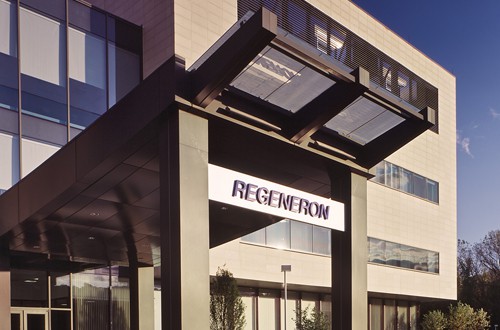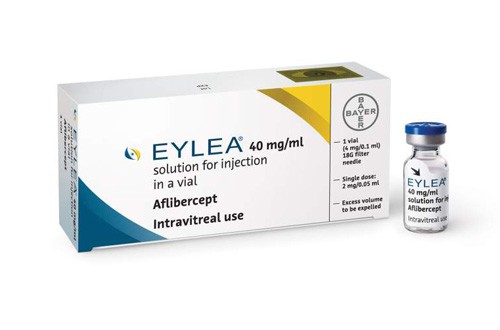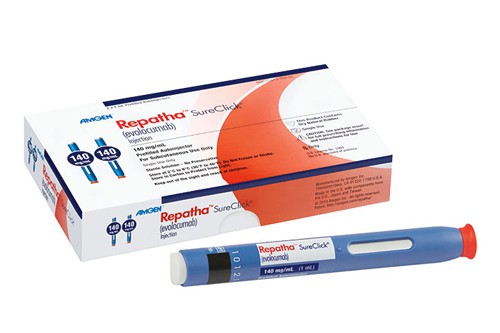
Lower-than-expected sales for two of Regeneron’s new products – Dupixent for atopic dermatitis and cholesterol-lowerer Praluent – are making investors nervous and sparked a further decline in the firm’s already depressed share price yesterday.
 Regeneron needs the two drugs, both partnered with Sanofi, to ramp up sales quickly before its ophthalmic blockbuster Eylea (aflibercept) – which generates nearly two-thirds of its revenues – starts to lose momentum. Eylea is already fending off pressure from Novartis’ Lucentis (ranibizumab) but faces more competition in the market from late-stage experimental drugs such as Novartis’ RTH258, as well as biosimilars of Lucentis.
Regeneron needs the two drugs, both partnered with Sanofi, to ramp up sales quickly before its ophthalmic blockbuster Eylea (aflibercept) – which generates nearly two-thirds of its revenues – starts to lose momentum. Eylea is already fending off pressure from Novartis’ Lucentis (ranibizumab) but faces more competition in the market from late-stage experimental drugs such as Novartis’ RTH258, as well as biosimilars of Lucentis.
The problem is that, as reported by Sanofi last week, Dupixent (dupilumab) sales in the three months of 2018 came in at $133m, around $30m less than expected. Meanwhile, Praluent (alirocumab) is still struggling to make headway, bringing around $60m in the quarter. And another new launch – Kevzara (sarilumab) for rheumatoid arthritis – also missed expectations and made just $12m.
Regeneron’s chief executive Len Schleifer said on a conference call that global sales of Eylea were $1.6bn, with Regeneron booking $984m, up 15%. He acknowledged that “many of our shareholders have questions about the sustainability of the Eylea franchise” but added he doesn’t expect serious competition until late 2019 – and believes there is nothing coming through the pipeline that is “substantially differentiated” from Eylea.
 That gives the company time to try to kickstart sales of its newer products. Earlier this week, Sanofi and Regeneron agreed a deal with Express Scripts to discount Praluent in return for a preferred formulary position versus Amgen’s rival drug Repatha (evolocumab). That will reduce the annual price of the drug from around $14,600 per patient to $4,500-8,000, and of course slash margins. Regeneron says it has been a challenge to balance access with affordability – and avoid “racing to a place where there’s no profit”.
That gives the company time to try to kickstart sales of its newer products. Earlier this week, Sanofi and Regeneron agreed a deal with Express Scripts to discount Praluent in return for a preferred formulary position versus Amgen’s rival drug Repatha (evolocumab). That will reduce the annual price of the drug from around $14,600 per patient to $4,500-8,000, and of course slash margins. Regeneron says it has been a challenge to balance access with affordability – and avoid “racing to a place where there’s no profit”.
As for Dupixent, Schleifer insisted the launch is going well and that expansion of the drug’s label to include other patient groups with atopic dermatitis as well as new indications such as asthma, nasal polyps and chronic obstructive pulmonary disease (COPD) “means there is a remarkably broad and deep pipeline within Dupixent itself”.
Analysts have suggested Dupixent could make $3bn at peak, but with sales actually falling in the first quarter versus the last three months of 2017, and despite Sanofi’s assurances that the dip resulted from inventory management, investors are getting jittery.
Schleifer spent a sizeable portion of the conference call talking up Regeneron’s emerging position in immuno-oncology, currently led by Sanofi-partnered PD-1 inhibitor cemiplimab, which is due for an FDA verdict in skin cancer in October but will be sixth in the class to market. The drug is backed up by a series of bispecific antibodies for cancer indications.
The company has chosen a first indication for cemiplimab (cutaneous squamous cell carcinoma) that has no competition yet from other PD-1/PD-L1-targeting drugs but could see competition fairly quickly, as well as a challenge moving into more fiercely-fought categories like non-small cell lung cancer.
Nevertheless, Schleifer told analysts that Dupixent and the immuno-oncology pipeline in particular are allowing Regeneron to diversify away from Eylea and “position us well to continue commercial success”.




